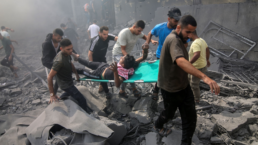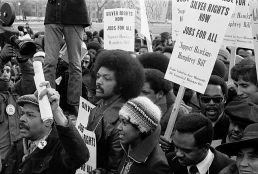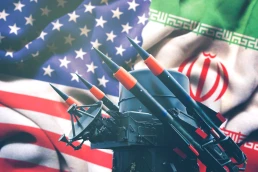U.S. officials and media are more inclined to listen to Israeli officials than Palestinian ones, but this only increases U.S. isolation by making it complicit in Israeli propaganda, both in fact and in the eyes of people and governments around the world.
By Medea Benjamin and Nicolas J. S. Davie
On Friday, October 27, the nations of the world voted in the UN General Assembly, by a vote of 120 to 14, for an “immediate, durable and sustained humanitarian truce leading to a cessation of hostilities” in Gaza. The resolution was sponsored by the government of sometime U.S. ally King Abdullah of Jordan.

Israel’s UN Ambassador responded with utter disdain, accusing those who voted in favor of the “ridiculous resolution” of supporting “the defense of Nazi terrorists” over Israel. In Gaza, Israel’s response to the global call for a truce was to escalate its bombing and expand its ground invasion.
The U.S. corporate media have not helped Americans understand how isolated our government is in its unconditional support and resupply of weapons for Israel’s genocidal military campaign, which has killed over 8,000 Palestinians, 30% of them women and 40% of them children, while destroying hospitals, apartment buildings, streets and schools, and turning Gaza into nothing short of hell on Earth for the bereaved survivors. According to Save the Children, Israel has killed more children in Gaza in three weeks than have been killed in all global conflicts since 2019.
The UN vote makes it clear how diplomatically isolated Israel and the United States are. The mere 12 countries that sided with Israel and the U.S. in the General Assembly were 4 from eastern Europe (Austria, Croatia, Czechia and Hungary); 2 from Latin America (Guatemala and Paraguay); and 6 small island nations in the Pacific.
Not a single country from western Europe, Africa, the mainland of Asia, the Caribbean or the Middle East voted with the U.S. and Israel. The countries that voted for a truce included many traditional U.S. allies (France, Spain, Portugal, Belgium, Norway, Ireland, Switzerland, New Zealand), while other U.S. allies like the U.K., Germany, Canada and Japan were among the 45 countries that abstained.
Israel and the United States are not only diplomatically isolated, but their governments are out of touch with their own people. As Israel prepared to launch its ground invasion of Gaza, a Maariv poll of Israelis found that public support for an immediate large-scale ground offensive of Gaza had fallen from 65% on October 17th to only 29% a week later.
Israelis, like the rest of the world, are watching the horrors of the massacre in Gaza, and have realized that their government has no real plan beyond massive, indiscriminate violence for its stated goal of destroying Hamas, which may well be unachievable no matter how many Israeli soldiers, prisoners captured on October 7 and Palestinian civilians it is ready to sacrifice.
In the United States, a Data for Progress poll, published on October 20, found that 66% of Americans wanted their government to “call for a ceasefire and a deescalation of violence in Gaza,” and to “leverage its close diplomatic relationship with Israel to prevent further violence and civilian deaths.”
Support was across party lines, but, for a Democratic administration and Democratic members of Congress, the 80% of Democrats who agreed with the poll’s statement should have been a wake-up call. Evidently they slept through the alarm, as Congress passed a bill promising unconditional military support for Israel’s campaign in Gaza by 412 votes to 10 on October 24, a green light for the anticipated escalation that followed.
By October 30, only 18 members of Congress had signed the resolution introduced by Rep. Cori Bush calling for an “immediate de-escalation and ceasefire.” The new House Speaker Mike Johnson has pledged that the first piece of binding legislation he will put to the floor is one to spend $14 billion to resupply Israel with weapons, a bill that is likely to sail through with overwhelming support from both parties.
The impotence of the U.S. government to contain the chaos its policies have unleashed can hardly be exaggerated. The U.S. embassy in Beirut has posted a message to all U.S. citizens to leave Lebanon immediately. It says, “You should have a plan of action for crisis situations that does not rely on U.S. government assistance,” and tells them they will have to sign a promissory note to reimburse the U.S. government if it helps to evacuate them.
So the results of the U.S. government’s massive investments in the power to kill and destroy have left it unable to protect or help its own citizens around the world. It instead directs them to a State Department web page titled “What the Department of State Can and Can’t Do in a Crisis.”
The current international isolation of the United States stands in sharp contrast to the way that Biden’s defeat of Trump in 2020 was welcomed around the world. Biden promised a new era of U.S. diplomacy, an end to U.S. wars in the Middle East, and renewed international cooperation on the most serious problems facing the world.
Instead, his policies are the worst of all worlds, continuing Trump’s ratcheting up of military spending and his illegal sanctions against Iran, Cuba and a dozen other countries, while shifting Trump’s Cold War with Russia and China into overdrive, and now fueling and escalating catastrophic proxy wars in Ukraine and Palestine.
But alternatives to American “leadership” are finally emerging. The UN Security Council is immobilized by self-serving U.S. and Russian vetoes, and exclusive rich boys’ clubs like the G7 and the World Economic Forum have only further entrenched neocolonialism and inequality. But now the world is turning to more representative fora like the UN General Assembly, the G20, G77, BRICS and regional groupings like the African Union, ASEAN and CELAC to more honestly debate our common problems and find new ways to solve them.
As the world comes together to build a post-neocolonial, multipolar world, U.S. propaganda is losing its power to shape the way people look at each new crisis. Israeli and U.S. officials, including Biden, have done their best to cast doubt on the death toll in Gaza, but these numbers are meticulously documented by Palestinian health authorities and accepted by the World Health Organization, UN agencies and NGOs that work there.
U.S. officials and media are more inclined to listen to Israeli officials than Palestinian ones, but this only increases U.S. isolation by making it complicit in Israeli propaganda, both in fact and in the eyes of people and governments around the world.
King Abdullah of Jordan, President Sisi of Egypt and Palestinian leader Abu Mazen canceled a meeting with Biden after Israel apparently killed hundreds of people with what appeared to be an air-burst bomb, as they sheltered at the Anglican Church’s Al-Ahli Hospital in Gaza City. Biden validated Abdullah, Sisi and Abu Mazen’s decision by doing exactly as they feared and publicly claiming that “the other team” was responsible for the hospital bombing.
While Palestinian officials have identified over 8,000 people killed in Gaza, Israeli officials have so far only identified 933 of the 1,300 or 1,400 people they say were killed in the Palestinian attack on October 7th.
The Ha’aretz newspaper in Israel has a web page with photos, names, ages and some personal details of the people killed in Israel who have been identified. At the prompting of the Israeli military, many Western politicians and media have painted the Palestinian attack as a massacre of civilians, so it may come as a surprise to see that at least 361 of the 933 dead so far identified were in fact soldiers, police and security officers.
But Hamas, Islamic Jihad and other Palestinian fighters also killed hundreds of civilians on October 7, as surely as Israel’s air strikes have killed thousands of civilians in Gaza. The prisoners they took back to Gaza also included both soldiers and civilians.
Ha’aretz’s records also raise questions about another story that has been widely repeated by Western media and politicians, including President Biden, which is that Israeli soldiers found 40 dead babies who had been decapitated by Hamas. There are 7 children below the age of 10 among the 572 civilian dead identified in Ha’aretz, but the youngest was 4 years old, not a baby. As with all these questions, we don’t know the answers, but we should be skeptical of unverified atrocity claims, especially since Israel has lied about previous war crimes and resisted independent, international investigations of them.
Since the fall of the Soviet Union left the United States with no rival to act as a check on its leaders’ unbridled and often unrealistic ambitions for global power, the U.S. has squandered a historic chance to build a peaceful, just and sustainable country, with shared prosperity for us and our neighbors around the world.
Our leaders’ illusion of military superiority has been a poison pill that has undermined every aspect of post-Cold War U.S. foreign policy. It has led them down a dead end from where they can no longer imagine alternatives to fighting and killing or arming their proxies to fight and kill, even as the consequences of these policies have become so deadly and destabilizing that they undermine the position of the United States in the world and leave it increasingly isolated.
Apart from the United States, the world is remarkably united behind the goal of ending the Israeli occupation of the Palestinian territories it occupied in 1967. The United States should stop fueling the occupation with an endless supply of weapons, and stop diplomatically shielding Israel from international efforts to end the occupation. Since the United States has utterly failed in its role as a mediator and honest broker between Israel and Palestine, acting instead as a party to the conflict on Israel’s side, it must now step aside to allow real mediators to take on that role.
Medea Benjamin and Nicolas J. S. Davies are the authors of War in Ukraine: Making Sense of a Senseless Conflict, published by OR Books in November 2022.
Medea Benjamin is the cofounder of CODEPINK for Peace, and the author of several books, including Inside Iran: The Real History and Politics of the Islamic Republic of Iran.
Nicolas J. S. Davies is an independent journalist, a researcher for CODEPINK and the author of Blood on Our Hands: The American Invasion and Destruction of Iraq.
Recent Posts
The Left Owes a Lot to Jesse Jackson
February 19, 2026
Take Action Now As a movement builder, spokesperson, and candidate for the presidency, Jesse Jackson’s accomplishments were massive. He was one of…
Trita Parsi Warns U.S. & Iran Have Incentives to Escalate Conflict
February 19, 2026
Take Action Now “We have a very dangerous situation, because both sides actually believe that a short, intense war may improve their…
Minneapolis: Organizing for the Protection of the Community
February 18, 2026
Take Action Now In speaking with residents in several parts of Minneapolis, beautiful stories of organizing on a block-by-block level emergedBy…
U.S. Sent a Rescue Plane For Boat Strike Survivors. It Took 45 Hours To Arrive.
February 17, 2026
Take Action Now In seas that could kill a person within an hour, it took nearly two days for a rescue plane to arrive.By Tomi McCluskey and Nick…




